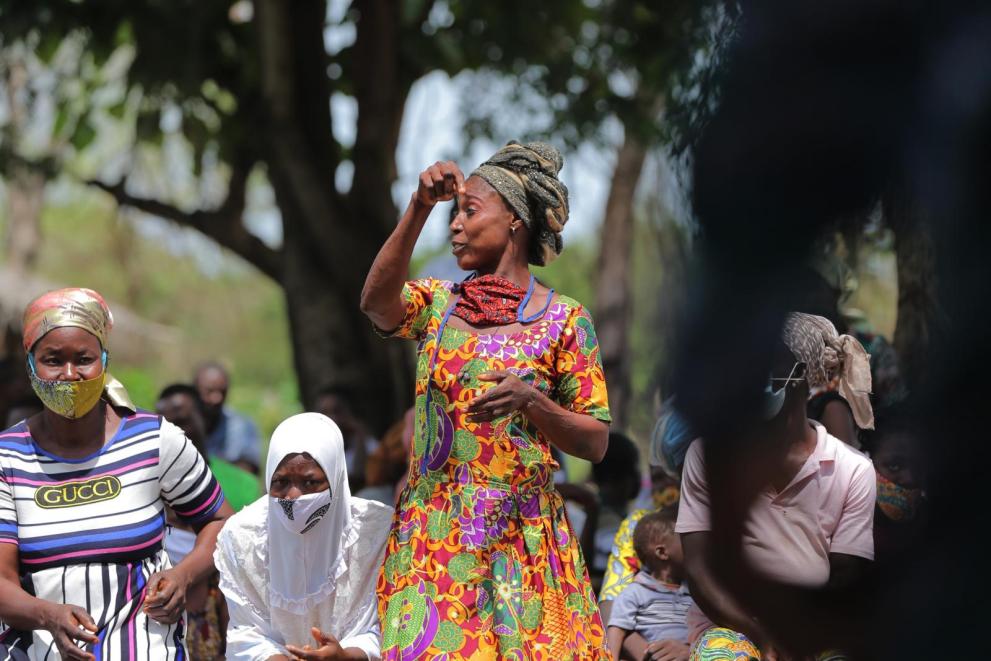
Climate change and unpredictable flooding makes the river in Mframafaw periodically impassable. It is a huge problem for farmer Meliama Sulemana and her seven children, cutting them off from the nearby school and market where she sells her produce. After consultations with the local community, the GrEEn project is constructing a culvert and bridge to channel the floodwaters away from the community and provide a safe access-way to local services.
Mframafaw is a lowland farming community some 25km from the district capital of Offinso in Ghana. A few years ago, Ms Sulemana's farm of maize, oranges and rice sustained herself, her children and funded the secondary education of her eldest child. Ms Sulemana’s high hopes for the future have faded as climate change has made it difficult for her and her family to make a living or access basic services like schools and hospitals.
“The situation has gotten so bad that we leave the fruits to rot in the farms since we do not see any point in harvesting them when we know there’s no way to get them to market” said Ms Sulemana. “In the past, I used to make enough money from my farm and was even able to save, but now I barely earn enough to feed my family.”
“Without external assistance, pregnant women in this town find it impossible to access healthcare during the raining season,” she added.
The GrEEn Project, or in full, the Boosting Green Employment and Enterprise Opportunities in Ghana (GrEEn) project, is a four-year action of the European Union, the Embassy of the Kingdom of the Netherlands in Ghana, SNV Netherlands Development Organisation and the United Nations Capital Development Fund (UNCDF) that is funded by the European Union Emergency Trust Fund (EUTF) for Africa, SNV and UNCDF. GrEEn aims at creating greater economic and employment opportunities for youth, women and returning migrants by promoting and supporting sustainable, green businesses in the Ashanti and Western Regions of Ghana; helping people like Ms Sulemana.
GrEEn project is taking the Local Climate Adaptive Living facility to Phase II in Ghana, using LoCAL's innovative performance based climate resilience grants to channel finance to local governments for locally led adaptation actions. Activities, guided by the needs of the community, might include land regeneration, green economic investments or climate proofed infrastructure development, as in Mframafaw.
The GrEEn Project incorporates the Local Climate Adaptive Living Facility, or LoCAL, which is designed and hosted by UNCDF and works with communities to build climate resilience, green local economies and restore ecosystems. Notably, GrEEn leverages LoCAL’s performance-based climate resilience grants to channel finance for climate adaptation to the local level using local government systems. One of the benefits of the LoCAL approach is its flexibility, allowing local communities to identify their needs and collaborate in finding a climate-proof solution.
Over the years, the village and local government authorities have tried to construct makeshift bridges over the river, which now breaks its banks every rainy season. However, these washed away whenever there is a heavy downpour. The women also tried splitting their harvest into small bundles to carry on their heads through the floodwaters, or contract local men with access to motorized tricycles to help them transport their goods. Nevertheless, these options proved either time consuming, hazardous, or costly – and sometimes all three.
According to Ms Sulemana and other women in the community, the plans for the bridge and culvert come just in time as climate change had all but killed off commercial farming activities and the village children were missing school.
“During the raining season children are reluctant to go to school due to the difficulty they face in crossing the flooded stream,” said Ms Sulemana. “How can we force our children to go to school when even we adults are struggling to cross the floodwaters?”
For more information about LoCAL, read the online brochure or download the brochure.
This article was first published here.
Details
- Publication date
- 29 July 2021
- Region and Country
- Ghana
- Thematic
- Greater economic and employment opportunities
- Partner
- United Nations Capital Development Fund
- SNV Netherlands Development Organisation, Ghana
